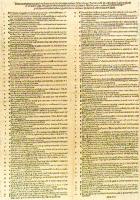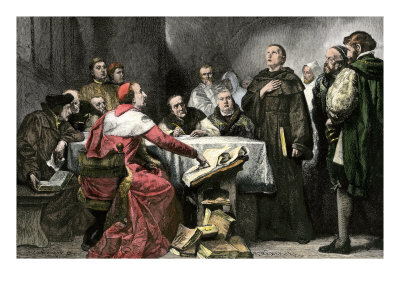 |
| Luther's 95 Theses which was nailed to Wittenburg Church's door. |
With being Lutheran, I have grown up with a decent understanding about Martin Luther. I have learned about him through Sunday School, Confirmation, and in a one of my history classes in high school. The Reformation began when Martin Luther nailed the 95 Theses to the Wittenburg Church door on October 31, 1517. During the time of this occurrence, the Church would exile or sentence people to death if they spoke out about how the Church was being operated. Because of his publication of the 95 Theses to the church door, Martin Luther was able to show himself as a religious, political, and religious figure in German history, along with religious history.
 |
| Portrait of Martin Luther |
With the Reformation, Luther was able to prove that he was a religious figure. He made the public aware that five of the seven sacraments were made up by the Church leaders. There were only two sacraments that were mentioned in the Bible: to be baptized and to take part in the Lord’s Supper. Luther was able to make logical arguments against the Church and used insults within his writing, something that was not heard of during that time period.
Luther became a cultural leader throughout his life. Because of his cause, commoners realized that they could have a say with the Church. They saw that they could take religious and political action without having to answer to the Holy Roman Empire. For the first time, Germans had the chance to experience freedom of faith and express their individuality. Several branches of Protestant were created after Luther’s Reformation. Another amazing act that Luther did during his lifetime was translating the Bible from Latin to German. This allowed commoners that were literate to be able to read and experience the Word of God for themselves instead of taking the Church’s word during services.
 |
| Martin Luther on trial before Cardinal Cajetanus in Worms |
Along with being a religious and cultural leader, Luther also became a political figure. Luther encouraged the Princes of the Holy Roman Empire to stand up to the Church. Because of this encouragement, he was able to save his life from execution by having the princes turn against the Church at Luther’s trial in Worms. Luther also inspired serfs and common people to rise against their rulers. With this movement, it was the start of the end of the feudal system. Another important aspect that Luther inspired was the start of public schools and public welfare programs. Luther was a significant leader in German history, changing the ways of Germany and religion in the Modern World.
No comments:
Post a Comment